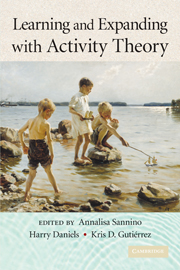Book contents
- Frontmatter
- Contents
- Contributors
- Editors' introduction
- 1 Activity Theory Between Historical Engagement and Future-Making Practice
- PART ONE UNITS OF ANALYSIS
- 2 Cultural-Historical Activity Theory and Organization Studies
- 3 Uses of Activity Theory in Written Communication Research
- 4 On the Inclusion of Emotions, Identity, and Ethico-Moral Dimensions of Actions
- PART TWO MEDIATION AND DISCOURSE
- PART THREE EXPANSIVE LEARNING AND DEVELOPMENT
- PART FOUR SUBJECTIVITY, AGENCY, AND COMMUNITY
- PART FIVE INTERVENTIONS
- Bibliography
- Author Index
- Subject Index
2 - Cultural-Historical Activity Theory and Organization Studies
Published online by Cambridge University Press: 05 June 2012
- Frontmatter
- Contents
- Contributors
- Editors' introduction
- 1 Activity Theory Between Historical Engagement and Future-Making Practice
- PART ONE UNITS OF ANALYSIS
- 2 Cultural-Historical Activity Theory and Organization Studies
- 3 Uses of Activity Theory in Written Communication Research
- 4 On the Inclusion of Emotions, Identity, and Ethico-Moral Dimensions of Actions
- PART TWO MEDIATION AND DISCOURSE
- PART THREE EXPANSIVE LEARNING AND DEVELOPMENT
- PART FOUR SUBJECTIVITY, AGENCY, AND COMMUNITY
- PART FIVE INTERVENTIONS
- Bibliography
- Author Index
- Subject Index
Summary
What is the appropriate way to evaluate a significant corpus of work in the applied social sciences? One way of considering Engeström's contribution would be to review his version of activity theory, his methodological approach, and his research studies, and to compare his work with related contributions. Such an approach is generally thought to be the essence of academic commentary, and in what follows I will include some comments of that kind. I shall argue, however, that Engeström's work should also be considered in a broader context. Cherns (1979) first pointed out that developments in the applied social sciences are only partly driven by advances in theory and methods; developments are influenced also by changing social priorities and shifting values. Extending Cherns's point, I take the view that applied social science work needs not only to be responsive to emerging concerns but also to contribute to the ways in which issues are understood and addressed.
ORGANIZATION STUDIES
I work in the field of organization studies, also known as organization theory and organization behavior, and it is from this perspective that I approach Engeström's work. Formal organizations are a distinctive feature of modern societies, and it is impossible to understand the nature of contemporary human activity without some appreciation of them. The field of organization studies has developed in a very different way than activity theory, and to introduce my comments I need to say something about this field and to sketch out its achievements and shortcomings as I understand them.
Information
- Type
- Chapter
- Information
- Learning and Expanding with Activity Theory , pp. 19 - 39Publisher: Cambridge University PressPrint publication year: 2009
Accessibility standard: Unknown
Why this information is here
This section outlines the accessibility features of this content - including support for screen readers, full keyboard navigation and high-contrast display options. This may not be relevant for you.Accessibility Information
- 39
- Cited by
